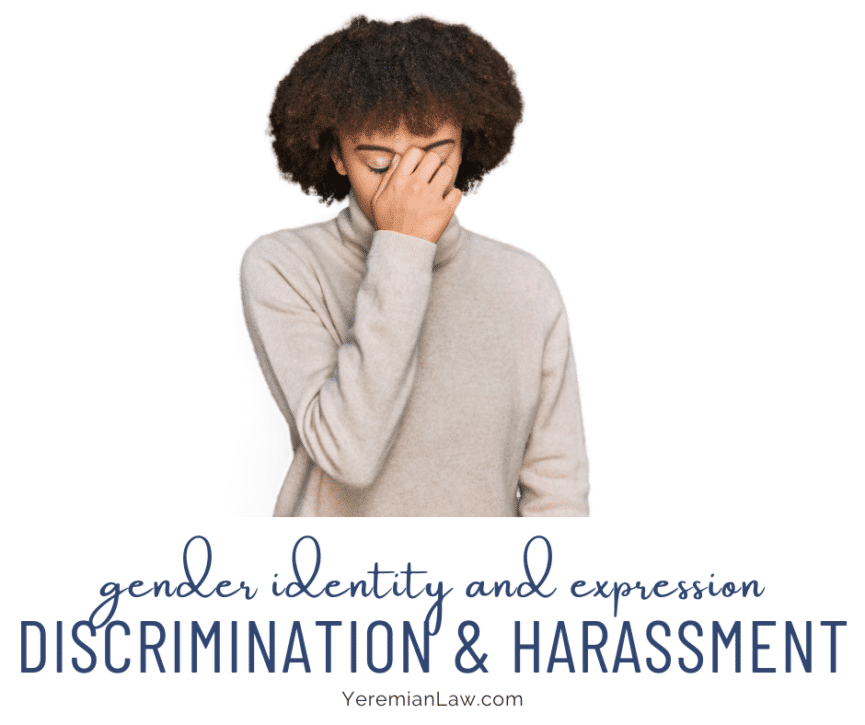If you’re like many people, you’re not exactly sure what legal protections exist to protect you from gender identity and gender expression discrimination. Only recently, new laws – and new interpretations of existing laws – have come into play to provide protections for the entire LGBTQIA+ community, including those with gender non-conforming and non-binary identities. This guide explains your rights and addresses common questions that you may have about how the state of California and federal laws protect you from harassment and discrimination in the workplace.
Gender Identity and Gender Expression Discrimination and Harassment
Unfortunately, people are harassed and discriminated against every day because of their gender identity and gender expression – but that doesn’t make it right. In fact, there are laws against this type of harassment and discrimination.
In 2020, the U.S. Supreme Court ruled (in Bostock v. Clayton County, in case you’re interested) that unlawful discrimination based on sex includes sexual orientation and gender identity. That means Title VII of the Civil Rights Act of 1964 provides specific protections against discrimination and harassment. It’s not just federal law, either; in the state of California, the Fair Employment and Housing Act, or FEHA, provides protections for all genders and gender expressions.
Related: FEHA FAQ: Unpacking the Fair Employment and Housing Act
Check out these commonly asked questions about gender identity and gender expression discrimination and harassment. If you don’t see your question here, feel free to call our office at 818-230-8380 or fill out the form at the bottom of this page to ask!
Is it Legal for My Employer or Coworker to Harass Me for My Gender Identity or Gender Expression?
It is not legal for your employer or a coworker to harass you over your gender identity or gender expression. If a coworker – including a supervisor – is harassing you, you need to make your employer aware. After your employer is aware, the employer (not you) is responsible for stopping the harassment.
But first, you must understand what makes harassment illegal. The harassment must be unwelcome conduct, and it must be so severe or pervasive that it interferes with your ability to perform your job. One incident can be so severe that it creates a hostile or abusive work environment, or many less-severe incidents can combine to create that type of work environment.
Related: Can you do something about sexual orientation discrimination?
What if My Employer Deadnames Me or Uses the Wrong Pronouns?
You have the right to be called by your real name – the one you live by. You also have the right to be called by the appropriate pronouns. If your employer or a coworker (with your employer’s knowledge) repeatedly and intentionally deadnames you or calls you by the wrong pronouns, it could constitute harassment.
Do Employers Have to Recognize Gender Non-Conforming Identities or Non-Binary Identities?
Employers in California are required to respect gender non-conforming identities and non-binary identities. The law requires employers to respect all gender expressions and identities.
Can I Be Discriminated Against for Transitioning?
Both California and federal laws protect transgender people and those in a transitioning status. You can, if you choose, tell your employer you’re transitioning (though you don’t have to). Your employer is not permitted to discriminate against you because of your transition.
Related: Employment discrimination information
Can I Use a Workplace Bathroom That Corresponds to My Gender Identity?
You have the absolute right to use a workplace bathroom that corresponds to your gender identity. Your employer is not allowed to tell you which bathroom to use if you have men’s and women’s bathrooms at your place of employment.
Do You Need to Talk to an Attorney About Gender Identity Discrimination?
If you believe you’ve been discriminated against because of your gender identity or gender expression, we may be able to help you. Call us at 818-230-8380 or fill out the form below to schedule a free consultation with an experienced Los Angeles and Glendale discrimination attorney now.




